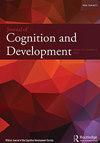Children’s and Adults’ Attribution of Moral Judgments to Human and Supernatural Agents
IF 2.1
2区 心理学
Q3 PSYCHOLOGY, DEVELOPMENTAL
引用次数: 3
Abstract
ABSTRACT Adults commonly conceptualize intentional harms as worse than accidental harms. We probed the developmental trajectory of this pattern and asked whether U.S. children (4 – to 7-year-olds) and adults expected other agents – including another person and God – to share their views. In contrast with some prior work, even the youngest children in the present study considered intent when making moral judgments. Although children did not distinguish among the agents when indicating how severely they would punish intentional and accidental transgressors, adults reported that God would punish less severely than would they themselves or another person. Furthermore, children and adults differed in their evaluation of how the agents would react to the transgressors: Adults and older children were more likely than younger children to attribute spiritual and religious reactions to God. These findings suggest that even young children’s moral judgments are sensitive to information about intent but that the propensity to distinguish others’ focus on intent from one’s own emerges more gradually across age.儿童和成人对人类和超自然因素的道德判断归因
成年人通常认为故意伤害比意外伤害更严重。我们探究了这种模式的发展轨迹,并询问美国儿童(4至7岁)和成年人是否期望其他代理人——包括另一个人和上帝——分享他们的观点。与之前的一些工作相比,本研究中即使是最小的孩子在做出道德判断时也会考虑意图。尽管儿童在表示他们将对故意和意外违法者处以多严厉的惩罚时没有区分不同的行为者,但成年人报告说,上帝对他们自己或他人的惩罚没有那么严厉。此外,儿童和成年人对代理人对违法者的反应的评价不同:成年人和年龄较大的儿童比年龄较小的儿童更有可能将精神和宗教反应归因于上帝。这些发现表明,即使是年幼的儿童,其道德判断也对有关意图的信息敏感,但随着年龄的增长,区分他人对意图的关注与自己的关注的倾向会逐渐显现。
本文章由计算机程序翻译,如有差异,请以英文原文为准。
求助全文
约1分钟内获得全文
求助全文
来源期刊

Journal of Cognition and Development
Multiple-
CiteScore
4.00
自引率
0.00%
发文量
29
期刊介绍:
The Journal of Cognition and Development is the official journal of the Cognitive Development Society (CDS). Some CDS members are concerned with basic research or theory; others focus on policy issues and practical applications. The range of interests includes cognitive development during all stages of life, and we seek to understand ontogenetic processes in both humans and nonhumans. Finally, their interests encompass typical as well as atypical development, and we attempt to characterize both biological and cultural influences on cognitive change and continuity.
 求助内容:
求助内容: 应助结果提醒方式:
应助结果提醒方式:


